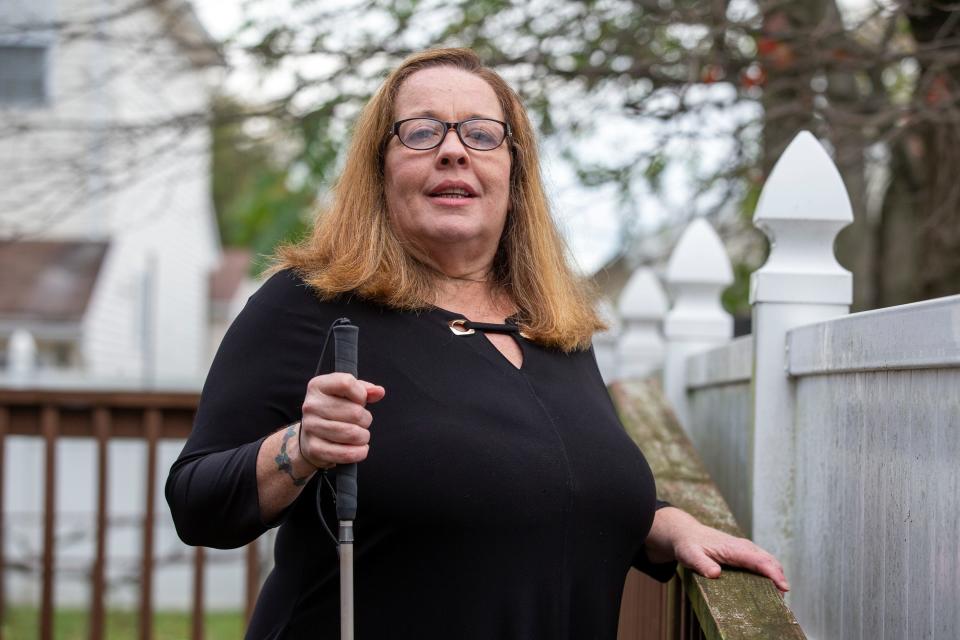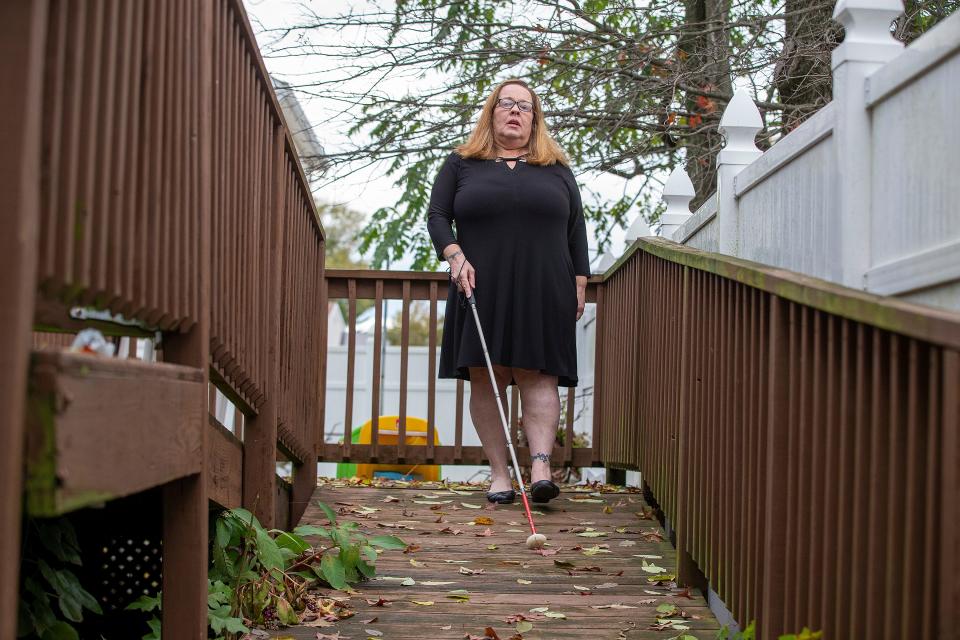Blind voters say they're still disenfranchised in NJ. But a new bill has given them hope
Despite years of activism, blind and partially sighted voters in New Jersey still can't exercise their right to cast ballots privately and independently, the community says.
That may finally change thanks to a push in the state Legislature.
Keyport’s Linda Melendez lost her vision more than 20 years ago. When she was featured in news stories across the state in 2020, she was hopeful people like her might finally be able to vote as easily as sighted citizens.
For years, those with vision loss have had two options, both flawed: They can fill out a ballot at home — but only by printing and signing forms. Or they can head to the polls, where transportation, balky assistive devices and unprepared election workers all pose problems.

There's been some progress, with many counties installing voting machines with new assistive features last year. But the technology is still imperfect, requiring blind voters to get help and violating the promise of a secret ballot.
A bill to allow fully electronic voting for the community passed the New Jersey Assembly earlier this year by a wide margin, but it still hasn't received even a hearing in the state Senate. Advocates are hopeful it may pass in the Legislature's end-of-year session, but that will be too late to fully enfranchise them for the Nov. 7 election.
“I don't feel like I have the same rights as my sighted peers have," said Melendez, 62, who leads the state chapter of the National Federation of the Blind. "They can vote independently and privately, and it's not an issue for them."
NJ's new voting machines
Helped by state funding, many counties have replaced aging election equipment in recent years. About half of New Jersey now employs ExpressVote XL machines, like those used in Morris County, said county Board of Elections Administrator Dale Kramer. The other half uses the Dominion Voting Systems, like those found in Bergen County, she said.
The two voting systems offer similar accommodations and are vast improvements when it comes to accessibility, Kramer said.
"The machines have 32-inch interactive, touch screen technology and the screen can be lowered or adjusted to accommodate a voter who is seated," she explained. "The text font can be increased on the screen, and the contrast can be adjusted as well for somebody who is visually impaired." The polling machines also include an audio device with headphones that allows a ballot to be read to voters and a keypad with Braille legends through which they can make their selections.
More: With grandpa as caddie, legally blind golfer from NJ is winning international acclaim
Advocates for those with blindness or low vision say that still leaves roadblocks in their way.
Too often, poll workers either don’t know how to set up the audio component or "don’t want to bother with it," said Mary Ciccone, director of policy at the group Disability Rights New Jersey. "Many individuals don’t want to wait around for who knows how long to get someone from the county to fix the machine or get it set up."
Most of the new machines also make use of an optical scanner that requires voters to check printouts of ballots after selections have been made. People with vision loss can't verify their intentions were accurately recorded, she Ciccone said.
Voting accessibility
“Nothing has changed," Melendez said. "I still can't vote independently. It gets discouraging to stand on line, and people are upset with you because the accessible voting [machine] is not working. It's just very discouraging.”
She's organized in recent years with vision- and hearing-loss communities as well as the League of Women Voters and had hoped that state lawmakers would quickly clear electronic balloting as a simple fix.
New Jersey voters with vision loss have been able to get an electronic ballot as an accommodation since 2020, said Alicia D'Alessandro, a spokesperson for the New Jersey Department of State, which oversees elections.

Those ballots can be accessed and filled out using screen-reading software. But, as of now, returning electronic ballots still requires them to printed out, signed and mailed — meaning voters still need the help of a sighted person. Only the returned hard copy gets counted. So although D'Alessandro said “voters are able to make their candidate selections independently,” it’s an answer that makes Melendez mad.
“The majority of blind people do not have printers,” she said. “Why would we have a printer when we can't see?”
The situation frustrates advocates because it's a problem that has been solved for other voters. Soldiers and other Americans overseas also receive ballots in the mail, but they can cast their votes and return them electronically, Ciccone said.
Voters with vision loss want the same ability to vote entirely remotely, doing away with the hurdles of getting to polling sites, dealing with complicated machines or printing, signing and mailing ballots.
Sighted voters "can get in their cars and drive to wherever they need to go, walk in and cast their votes," Melendez said. "I can't get in the car. I have to rely on transportation. If the weather is bad, I can't walk to where I need to go vote."
Voting options: Voters with disabilities have expanding options in NJ: Here's how to find help
“When I get to where I have to go vote I'm not welcomed by even the poll workers, because they have to hook up the machine, and most of the time it does not work," she continued. "It takes one of the voting polls out of commission for the voters who see to use, so it holds up the line. It's a very confrontational environment to be in, so most times we don't go to vote, and that's not really fair or right.”
Electronic ballots
The Americans with Disabilities Act guarantees blind and visually impaired people the right to vote privately and independently, but it’s not private if it can't be done independently, according to Disability Rights New Jersey.
Thirteen states, including Massachusetts, Colorado and North Carolina, currently let voters with disabilities return ballots electronically, according to the National Conference of State Legislatures.
In New Jersey, the state Assembly voted 69-3 in February to allow ballots to be returned electronically by voters with applicable disabilities. A companion bill, S-3302, was introduced in the state Senate a year ago but has seen no movement since then. Disability Rights New Jersey has been lobbying for the change and found a receptive ear in Assembly Majority Leader Louis Greenwald, a South Jersey Democrat.
"I was saddened to learn that New Jersey's vote by mail system stops halfway in providing an accessible mail-in ballot to voters with visual and dexterity impairments, since it requires them to print and sign their ballot," Greenwald said in a statement.
"I felt I had to do something about this issue. The bill passed with strong bipartisan support in the Assembly, and I'm thrilled to have the governor's support on it. Ensuring that every New Jerseyan, regardless of disability, has the ability to vote privately and independently, whether in person or by mail, is common-sense and the right thing to do."
State Sen. Fred Madden, a sponsor of the Senate version, said the bill is a "priority" that he'll work to get approved "during the lame duck period before the end of the year."
"Blind voters should have their rights respected and their needs accommodated so they can participate equally in the election process,” said Madden, a Democrat who represents parts of Camden and Gloucester counties.
Gene Myers covers disability and mental health for NorthJersey.com and the USA TODAY Network. For unlimited access to the most important news from your local community, please subscribe or activate your digital account today.
Email: myers@northjersey.com
Twitter: @myersgene
This article originally appeared on NorthJersey.com: Blind and low-vision voters in NJ may finally get accommodation

